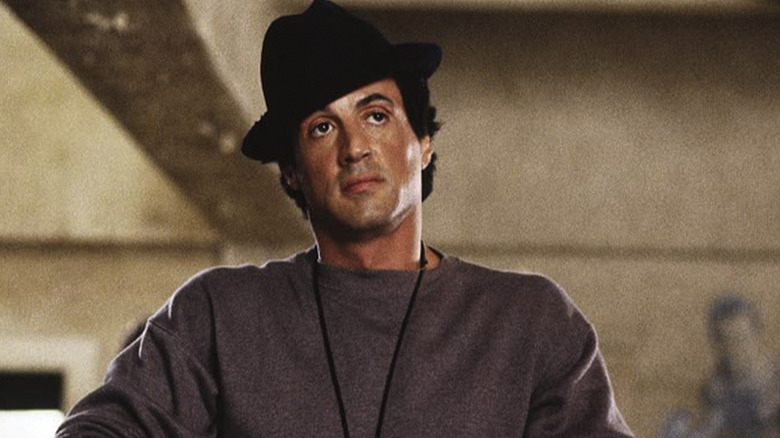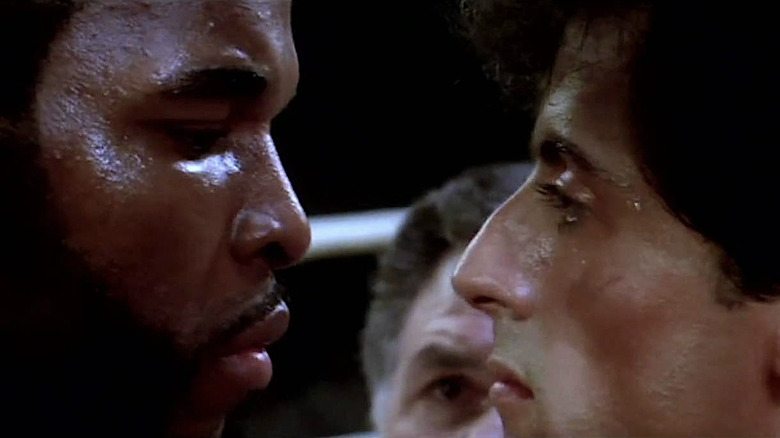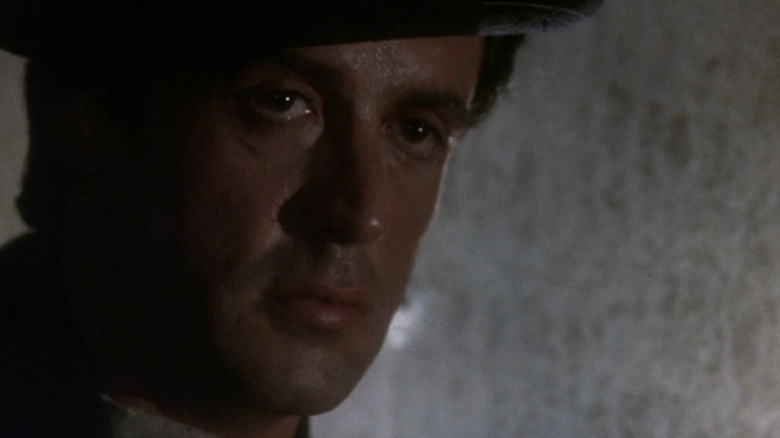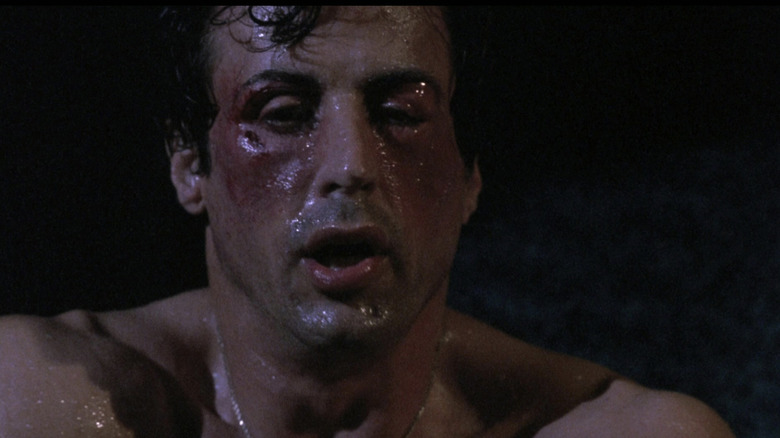Rocky V Almost Had A Different, More Tragic Ending
In 1976, an unknown actor named Sylvester Stallone introduced the world to Rocky Balboa and his eternal struggle to prove himself. The story of a down-and-out underachiever going toe-to-toe with the world's greatest boxer charmed audiences and propelled Stallone into a long career of portraying heroic, larger-than-life characters. Even after playing the lead character in classics like "First Blood" and "Demolition Man," Sly's most popular character will always be Balboa.
After falling in love with Rocky in the first film, audiences followed the southpaw through five more films, where he battled a slew of increasingly large and violent opponents. Balboa doesn't win every fight, but he always dedicates himself to the pursuit of victory and provides audiences with an inspiring, feel good story. However, after four films of this formula, Stallone was ready for a change.
According to CBS Philadelphia, Stallone initially killed the lovable underdog in "Rocky V," but the studio wouldn't allow the hero to die.
Why Rocky was successful
"Rocky" is all about an underachieving boxer from the wrong side of the tracks who decides to put it all on the line and contend with the world's best boxer. On top of relatable characters and a classic hero's journey story structure, the film succeeded by tapping into universal themes of adversity and courage through the eyes of an ultimate underdog. Stallone made this formula work longer than it should have. Along with fighting, Rocky's greatest skill is attracting large boxers with violent streaks, and that's exactly what he does for the first four movies.
After beating Apollo Creed (Carl Weathers) in the second film, Balboa becomes the hHeavyweight champion of the world, and should no longer fit the underdog stereotype. He lives in a swanky neighborhood, owns nice cars, and wears fancy clothes. But nobody wants to watch a movie about a spoiled, rich boxer, so Stallone continued to create bigger and meaner opponents for the champ. After defeating Apollo, he takes on trash-talking Clubber Lang (Mr. T) in "Rocky III" before facing his biggest opponent yet, Ivan Drago (Dolph Lundgren), in "Rocky IV."
Despite its repetitiveness, "Rocky" fans continued to enjoy the underdog template, and each new film grossed more than the last. But Stallone grew bored of the same storyline. In "Rocky V," Balboa learns he has permanent brain damage from his fight with Drago, and that continuing a boxing career could kill him. The typical underdog formula would find a way out of this and see Rocky win one last time, but Stallone decided to shake things up and kill his most successful character.
Rocky's near-death
In "Rocky V," Balboa retires from boxing and begins training an up and coming fighter, Tommy Gunn (Tommy Morrison). Although the young boxer has some success, the press are more interested in Rocky, which drives Gunn away from Rocky. In the ultimate macho display, Gunn and Rocky end up settling their differences in a street fight, which Rocky wins. But this wasn't Stallone's original idea.
The original script ended with a severely injured Balboa dying in Adrian's lap on the way to the hospital. Reportedly, Stallone cried and battled nausea while writing the scene, but was fully committed to ending the franchise and the Balboa character. The film's director, John G. Avildsen, told CBS Philadelphia that he was also a fan of the ending:
"And the last scene of the movie, Adrian comes out of the hospital and there's the world press assembled because Rocky then is a big deal and she announces that he is dead, but as long as people believe in themselves Rocky['s] spirit will live forever. And when I read that I said, 'Wow what a great way to go out. What a beautiful ending!'"
A few weeks into filming, studio executives put the kibosh on Balboa's death:
"A couple of weeks into the shooting I got a call from the head of the studio and they said, 'Oh by the way Rocky's not going to die. Batman doesn't die, Superman, James Bond, these people don't die.'"
So Balboa lived, but "Rocky V" flopped and is widely considered the worst film of the entire franchise. Winning a street fight against a cocky, young fighter pales in comparison to defeating worthy opponents like Creed, Clubber Lang, and Ivan Drago. The fairytale ending seems forced, predictable, and far less triumphant than all the others.
Let underdogs die
The entertainment industry has a long history of successful underdogs (even one who dabbles in boxing) because audiences love a dark horse. However, the reason we root for the underdog is because we know the rug can be pulled out from underneath them at any moment, and the odds of them ending up landing on their back are very high. Watching Rocky continue to get knocked down and get back up again filled audiences with the warm and fuzzies, but the character lost his spark when studio executives began seeing him as Superman.
Rocky's death was avoided because the purse holders tried to turn Rocky into a superhero. It's an understandable desire, since modern superhero movies tend to be crowd-pleasers and make ridiculous amounts of money, but no one wants to see Rocky in tights and a cape. Moviegoers prefer to keep Rocky a classic underdog who strives to be better, stronger, and faster — the determined dark horse who, despite his best efforts, will never achieve super speed, invulnerability, or any other super power.
Audiences like Rocky swollen and bloody, and, if the box office receipts of "Rocky V" are anything to go by, they might have actually liked him better dead.



